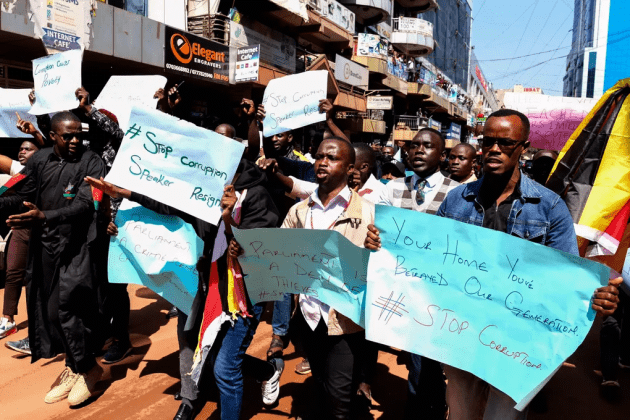
Anti-Corruption Protests Erupts in Kampala as Ugandans Seek to Emulate Kenya’s Success Against Corruption
Fiona Nanna, ForeMedia News
5 minutes read. Updated 1:58PM GMT Tues, 23July, 2024
Anti-corruption protests have erupted in Uganda’s capital, Kampala, as inspired by recent actions in neighboring Kenya. On Tuesday, Ugandan security forces arrested dozens of individuals attempting to march to the parliament building to protest against high-level corruption, in what authorities have deemed unlawful demonstrations.
Ugandan police and military forces were heavily deployed across various parts of Kampala, where small groups of protesters had gathered. In several instances, campaigners were roughed up by police and forced into trucks. The use of force by police to disperse demonstrations, particularly those organized by opposition leaders, is a frequent occurrence in Uganda.
These protests are driven by Ugandans who are hoping to replicate the success seen in Kenya. Recently, widespread street action in Kenya led to the dismissal of almost the entire cabinet by the president, following strong opposition to a contentious tax proposal.
In Uganda, public anger has been further ignited by mounting allegations of corruption against Parliament Speaker Anita Among. Calls for her resignation have been met with her firm rejection. The anti-corruption campaign gained momentum with online revelations of alleged irregular expenditures by the speaker’s office and other associated individuals. Among, a senior member of Uganda’s ruling party, has since faced sanctions from both the U.S. and the U.K. She denies any wrongdoing, asserting that she has been unfairly targeted in a country plagued by rampant official corruption. An official probe is currently investigating the source of her wealth and accusations of misusing parliamentary resources.
President Yoweri Museveni, who has held power since 1986, declared over the weekend that street protests would not be tolerated. In a televised address, Museveni stated, “We have defended the direction of Uganda’s revolutionary path in the past and we shall defend it even more now,” cautioning protest organizers that they were “playing with fire.”
Museveni’s administration has long been criticized for protecting influential corrupt officials from legal repercussions. Despite his promise to tackle corruption following his reelection to a sixth term in 2021, many Ugandans remain skeptical about the potential for meaningful change.
Local media frequently cover corruption issues, but activists, opposition figures, and other individuals attempting to organize street demonstrations often face arrest under a law that mandates prior notification to the police for any planned rallies.
For more on the latest in African politics, visit our comprehensive coverage here.

